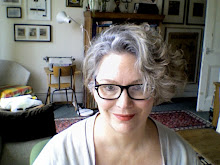 Okay, what is it about words? I know it's late in the day to be asking that question. But as the song says: "words are all we have..." so ask we must. In last week's Independent on Sunday Jim McCue distinguished between wordplay "standing up for meaning" and "standing in for meaning," in a review - called MacNeice Knew When to Stop - of Paul Muldoon's new collection, Horse Latitudes. This is an excellent distinction, whichMcCue underlines by making most of his most cogent points by way of puns (like the one where he refers to "Horse Lassitudes"; now you don't actually have to read the review).
Okay, what is it about words? I know it's late in the day to be asking that question. But as the song says: "words are all we have..." so ask we must. In last week's Independent on Sunday Jim McCue distinguished between wordplay "standing up for meaning" and "standing in for meaning," in a review - called MacNeice Knew When to Stop - of Paul Muldoon's new collection, Horse Latitudes. This is an excellent distinction, whichMcCue underlines by making most of his most cogent points by way of puns (like the one where he refers to "Horse Lassitudes"; now you don't actually have to read the review).
Elsewhere McCue says Muldoon's "extravagance has tipped into nonsense." This is an idea which would bear more unpacking than I can give it in this post, right now, and I may well come back to it. In the context in which he quotes it it may be true, but I still am not sure.
But even in this review there are enough snippets from the poems, including a conjunction of bubble wrap and bladderwrack, to make it possible that the book would, still, be the tonic one hopes for.
Thomas Sutcliffe was "enchanted" by Muldoon's use of anaphora in the Independent, for example, and James Fenton was "transported" (not to Australia) by the whole book, in the Guardian.
 And then, over in the Telegraph, Don Paterson's Rilke 'versions' (published with the truncated and effective title Orpheus) are described by Jeremy Noel-Tod as "translation with poetic licence". Apparently, according to an Afterward Paterson latched onto Rilke "as a personal quest for a text of consolation after a 'painful conversion to scientific materialism'."
And then, over in the Telegraph, Don Paterson's Rilke 'versions' (published with the truncated and effective title Orpheus) are described by Jeremy Noel-Tod as "translation with poetic licence". Apparently, according to an Afterward Paterson latched onto Rilke "as a personal quest for a text of consolation after a 'painful conversion to scientific materialism'."
The review is interesting, in some ways more than the book (that is, to me), because of how it raises this very issue - the fear of it not being, in fact, Rilke. But if it's not Rilke, is it Paterson? Is it Paterson merely hanging his clothes in Rilke's closet? And if so, will they smell of mothballs?
Now, I admit I am not a big lover of Rilke; and Noel-Tod says that he thinks "even Rilke's translators, it seems, think him a bit wet." Don Paterson certainly has a more muscular way of writing than the visionary poet had, and that may be the gist of it, though it seems a bit unfair when it was the materialism he was trying to escape from in the first place. The following paragraph of the review in particular worries me:
...the reckless declarative arguments of Rilke's full rhymes tend to be dampened by Paterson's more muted half-tones. The original conclusion to Sonnet II.14 imagines how one who slept "deep among things" – specifically, flowers – might either return enlightened or stay among them, so that "they'd bloom and praise / him". But in Paterson's half-rhyme for "waken", the flowers only "weaken". Similarly, at the end of Sonnet I.11, Rilke has us "rejoice" to "believe" in a constellation called The Horseman; Paterson only that we "insist" that we "read" it.
(O Eminem, where are you now?)
Adam Philips, in the Observer, however, began his review with this paragraph, which lays the terrain boldly out:
When John Berryman wrote in his third Dream Song that 'Rilke was a jerk', a lot of readers of Rainer Maria Rilke in translation were probably relieved. The Pseuds' Corner sonorities of Rilke we could read - 'and at the same time know the condition/ of not being, the infinite ground of your deep vibration' and so on - seemed a far cry from the poet recognised 'abroad' as a great European modernist.
The translation/version debate is a bit boring, I know, & I never understand (money apart, of course) why 'versions' don't get published in parallel with the original texts the way translations do. Or alongside a literal translation. Then the reader not blessed with encyclopaedic knowledge of the original, or with time to go look everything up, or who is perhaps limited to reading on the Tube, and thus can't carry an entire library of original versions alongside, would be in a position to understand what the version is actually saying - by its rejections, as well as its inclusions.
As a side issue, or not, there are lots of poets currently writing lots of 'versions' of non-English-language poets, some alive and some dead. I know of one poet who is unable to publish what he thought were translations of his own work, because they have been co-opted as "versions" by another poet. This raises a tedious question around 'what is a poem' - be it 'a machine for remembering itself', 'the best words in the best order', or 'news that stays news'. It just, as you might say, "makes me wonder."
































